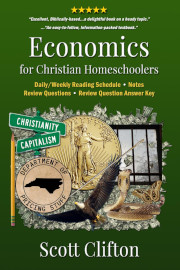Scott Clifton’s Economics for Christian Homeschoolers teaches selected topics from macroeconomics from a biblical and free market (Austrian School) viewpoint. It addresses the role of government more extensively than most high school courses in economics since government has a huge influence on economics in the U.S.—for the worse from Clifton’s perspective.
This 15-week course covers topics such as whether the government should interfere in the economy, the nature of capitalism, why socialism doesn’t work, the right to property, the nature of profit, inflation and the Federal Reserve, why price controls don’t work, government spending and waste, tariffs, taxes, minimum wage laws, and government regulation through professional licensing. The topics themselves have been selected to promote the author’s point of view.
Clifton teaches through historical applications, present-day observations, logical analysis, and the writings of experts such as Adam Smith, Ludwig von Mises, and Frederic Bastiat.
The course is set up in a very practical format, allowing homeschoolers to work independently most of the time, and is easy for both students and parents to use.
The material for each week is presented with reading assignments for four days and questions to be answered and discussed on the fifth day. (Clifton himself teaches online and in-person classes that meet once a week.) A free answer key is available online, so parents can more easily discuss the questions with students. The book assigns two days for “final review” during the last week, presenting essay-type questions for students to answer that cover key ideas taught throughout the book. The book references lessons where each concept was covered but there are no answer keys for the final reviews. For a final exam, parents could have students write out answers to some of these questions without referring to the book.
In the book, Clifton refers to online tests for those students enrolled in his live classes—tests not available to others. While these tests might be helpful, there’s plenty of material within the book for a complete course.
Economics is a vast subject, and this course addresses only selected topics. Following up with a course in personal finances (microeconomics) would be an excellent way for students to consider how macroeconomic ideas and events influence their personal choices.
Summary
Economics for Christian Homeschoolers should be great for homeschooling families that share Clifton’s point of view and want their children to learn a biblically based, free-market view of economics.










